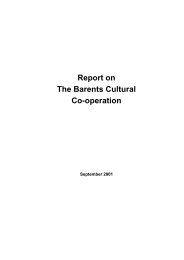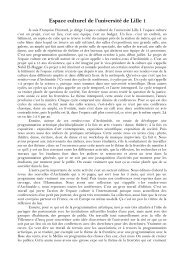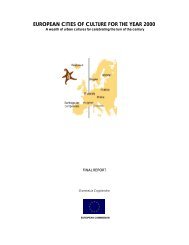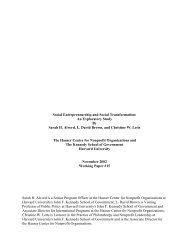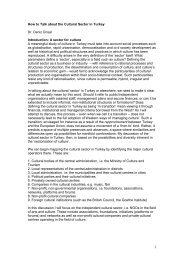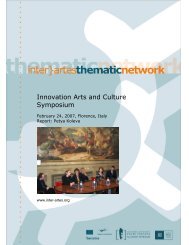A guide to the export and import of cultural goods between Russia ...
A guide to the export and import of cultural goods between Russia ...
A guide to the export and import of cultural goods between Russia ...
Create successful ePaper yourself
Turn your PDF publications into a flip-book with our unique Google optimized e-Paper software.
France<br />
Chapter 3: European Union Member States<br />
whe<strong>the</strong>r certain <strong>cultural</strong> <strong>goods</strong> should be retained on French terri<strong>to</strong>ry, prior <strong>to</strong> a decision<br />
by <strong>the</strong> Minister <strong>of</strong> Culture <strong>to</strong> refuse an <strong>export</strong> certificate.<br />
It receives all applications for permission for temporary <strong>export</strong> <strong>of</strong> national treasures (essentially<br />
works <strong>of</strong> art from <strong>the</strong> collections <strong>of</strong> museums in France), as well as applications<br />
for temporary <strong>export</strong> licences for o<strong>the</strong>r <strong>cultural</strong> <strong>goods</strong> as defined by national legislation.<br />
The Bureau also controls <strong>the</strong> re-<strong>import</strong>ation <strong>of</strong> all <strong>the</strong>se works.<br />
The French Cus<strong>to</strong>ms Authorities, through <strong>the</strong> SETICE (Service des Titres du Commerce<br />
Extérieur) <strong>of</strong>fice are also closely involved, notably in <strong>the</strong> issue <strong>of</strong> EU <strong>export</strong> licences <strong>and</strong> in<br />
<strong>the</strong> control <strong>of</strong> <strong>export</strong> <strong>and</strong> <strong>import</strong> <strong>of</strong> <strong>cultural</strong> <strong>goods</strong>.<br />
Do I need an <strong>export</strong> licence?<br />
French law differentiates <strong>between</strong> two types <strong>of</strong> <strong>cultural</strong> <strong>goods</strong>:<br />
• National treasures<br />
• Cultural <strong>goods</strong> (as defined by Law No. 92-1477)<br />
National treasures are <strong>cultural</strong> <strong>goods</strong> defined as being <strong>of</strong> major interest <strong>to</strong> French national<br />
heritage. Their <strong>export</strong> is restricted. They may be owned by a public authority or by individuals.<br />
Works belonging <strong>to</strong> public collections in museums in France are au<strong>to</strong>matically<br />
considered <strong>to</strong> be national treasures. French national treasures cannot be <strong>export</strong>ed on<br />
a permanent basis. Temporary <strong>export</strong> for exhibition, res<strong>to</strong>ration, expert appraisal, loan<br />
<strong>to</strong> foreign museum may be authorised but only on <strong>the</strong> basis <strong>of</strong> a licence for temporary<br />
removal. The <strong>goods</strong> must be returned <strong>to</strong> France on a specified date.<br />
O<strong>the</strong>r <strong>cultural</strong> <strong>goods</strong>, as defined by national law, are not restricted for <strong>export</strong> but still<br />
require a licence <strong>to</strong> leave <strong>the</strong> country. Permanent <strong>export</strong> licences may be granted for this<br />
type <strong>of</strong> <strong>goods</strong>. You do not need a licence if <strong>the</strong> <strong>goods</strong> have been in France for less than<br />
two years. If <strong>the</strong>y were <strong>import</strong>ed lawfully <strong>to</strong> France less than 50 years ago, <strong>the</strong>y are au<strong>to</strong>matically<br />
authorised <strong>to</strong> leave <strong>the</strong> country (unless listed as protected <strong>cultural</strong> <strong>goods</strong>), but<br />
you still need <strong>to</strong> apply for a national certificate for <strong>export</strong> authorisation.<br />
The categories <strong>of</strong> <strong>cultural</strong> <strong>goods</strong> that are defined under French national legislation <strong>and</strong> <strong>the</strong>refore<br />
require a certificate (<strong>export</strong> authorisation) are virtually <strong>the</strong> same as those defined in Commission<br />
Regulation 3911/92. There are some small differences in a few areas. A comparative table <strong>of</strong><br />
<strong>the</strong> categories, value <strong>and</strong> age thresholds that apply under both legislations is available on <strong>the</strong><br />
website <strong>of</strong> <strong>the</strong> French cus<strong>to</strong>ms authorities: http://www.douane.gouv.fr/data/file/3790.pdf.<br />
If you want <strong>to</strong> <strong>export</strong> a <strong>cultural</strong> good from France <strong>to</strong> <strong>Russia</strong> that is defined by <strong>the</strong> legislation,<br />
you will require <strong>the</strong> national <strong>export</strong> licence (a certificat or certificate) <strong>and</strong> <strong>the</strong> EU<br />
<strong>export</strong> licence. The certificate is required <strong>to</strong> take <strong>the</strong> <strong>cultural</strong> <strong>goods</strong> out <strong>of</strong> France <strong>and</strong> <strong>the</strong><br />
licence is required <strong>to</strong> <strong>export</strong> <strong>the</strong>m <strong>to</strong> a third or non-EU country.<br />
Practical guidance for people leaving France with <strong>cultural</strong> <strong>goods</strong> is available on <strong>the</strong> website<br />
<strong>of</strong> <strong>the</strong> French cus<strong>to</strong>ms: http://www.douane.gouv.fr/page.asp?id=52.<br />
94





